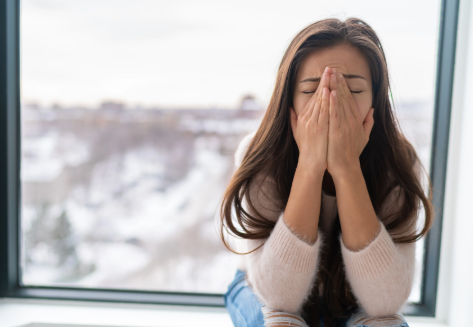Understanding Withdrawal Symptoms from Lexapro: What Happens When You Stop Taking It?

When people take medications like Lexapro, which helps manage anxiety and depression, they might not realize that stopping it can come with some side effects. In this blog, we’ll dive into what Lexapro withdrawal is, why it happens, and how you can feel more comfortable during the process. We’ll keep things simple, so everyone, even if you’re new to the topic, can understand!
What Is Lexapro?
Lexapro, also known by its generic name, escitalopram, is an antidepressant that belongs to a class of drugs called SSRIs, or selective serotonin reuptake inhibitors. SSRIs work by increasing levels of serotonin, a "feel-good" chemical in your brain, to improve mood, reduce anxiety, and help with depression.
Why Do People Experience Withdrawal?
When someone takes Lexapro for a long time, their brain becomes used to the medication. Lexapro helps maintain a stable level of serotonin in the brain. But when someone suddenly stops or reduces the dose of Lexapro, the brain has to quickly adapt, which can lead to withdrawal symptoms. This happens because the brain may have trouble adjusting to a sudden drop in serotonin levels.
These withdrawal symptoms aren’t exactly the same for everyone. According to the Mayo Clinic and other experts on brain health, some people may experience very mild symptoms, while others might feel uncomfortable for a few weeks.
Common Withdrawal Symptoms
Dizziness: Some people report feeling lightheaded or dizzy. It may feel like the room is spinning or that balance is off.
Irritability and Mood Swings: Without Lexapro’s effect on serotonin, emotions can feel unsteady. Some people may feel grumpy, sad, or even anxious for no clear reason.
Headaches: Many experience headaches, especially during the first few days or weeks.
Fatigue: It’s common to feel very tired or sluggish during withdrawal.
"Brain Zaps": This unique symptom feels like tiny electrical shocks or “zaps” in the brain. They don’t last long but can be surprising and uncomfortable.
Flu-like Symptoms: People might feel a bit like they have the flu, with symptoms such as nausea, sweating, and muscle aches.
Sleep Problems: Stopping Lexapro can make it hard to fall asleep or stay asleep. Some people even experience vivid dreams or nightmares.
Concentration Problems: It might feel difficult to focus on tasks or remember things, which can be frustrating.
These symptoms are most common during the first two weeks after stopping Lexapro, but for some people, they can last longer.
What Does Science Say About Lexapro Withdrawal?
Researchers studying Lexapro withdrawal have found that it mainly has to do with serotonin. According to neuroscience experts, Lexapro works by keeping serotonin levels in the brain high. When the medication is stopped, serotonin levels can drop, and the brain needs time to readjust.
The Cleveland Clinic and Harvard Health suggest that the withdrawal symptoms occur as the brain slowly adjusts back to normal serotonin levels. Over time, the brain does adapt, but this “reset” period can cause discomfort.
Why Stopping Suddenly Can Be Risky
Health experts strongly recommend not stopping Lexapro suddenly. Doing so can make withdrawal symptoms more intense. Stopping “cold turkey” means your brain doesn’t have time to adjust, which makes everything feel more uncomfortable. Instead, it’s best to gradually reduce the dose under the guidance of a doctor. This process is called “tapering,” and it helps reduce the risk and severity of withdrawal symptoms.
How to Manage Withdrawal Symptoms
Work with Your Doctor: It’s important to have a doctor guide you through the process. Doctors often help by creating a tapering schedule that reduces Lexapro dosage slowly, sometimes over several weeks or even months.
Be Patient with Yourself: Withdrawal symptoms can be frustrating, but remember that they don’t last forever. Give yourself time to heal, and don’t push yourself too hard.
Stay Active: Exercise is a great way to boost mood and energy levels naturally. Activities like walking, yoga, or light workouts can improve mood and reduce some withdrawal symptoms.
Sleep Well: A good sleep routine can make a big difference. Try to go to bed at the same time each night and avoid screens for an hour before bed. You can also try calming activities before sleep, like reading or listening to soothing music.
Stay Hydrated and Eat Healthy: Drinking water and eating nutritious foods can help your body feel better during the adjustment period. Avoiding caffeine and alcohol may also help, as these can make withdrawal symptoms worse.
Talk to Friends or Family: Having support from people you trust can make a big difference. You might feel irritable or sad at times, so letting others know what you’re going through can help them understand and support you.
Consider Therapy or Counseling: Talking to a mental health professional can be helpful during withdrawal. Therapy can help you manage emotions and develop coping strategies.
How Long Does Lexapro Withdrawal Last?
The duration of withdrawal symptoms can vary from person to person. For some, the symptoms might last just a week or two, while others might experience them for a few months. Generally, symptoms are the most intense in the first few weeks after stopping the medication and tend to improve over time.
According to experts from institutions like Stanford and Johns Hopkins, withdrawal symptoms don’t mean Lexapro is addictive. It’s just that the brain needs time to adapt after the medication is stopped.
When to Seek Help
While withdrawal symptoms are often mild, sometimes they can feel overwhelming. If you ever feel like you can’t handle the symptoms, it’s important to reach out for help. Your doctor may be able to suggest additional ways to ease symptoms, or they might adjust your tapering plan.
Key Takeaways
Gradual Tapering Is Essential: Stopping Lexapro gradually, rather than suddenly, can make withdrawal easier to handle.
Symptoms Are Temporary: Withdrawal symptoms are usually temporary and improve over time.
Support Makes a Difference: Talking to loved ones and working with healthcare professionals can provide the help you need.
Self-Care Is Powerful: Exercise, sleep, and a healthy diet can all play important roles in managing symptoms and helping your body adjust.
Final Thoughts
Lexapro withdrawal can be challenging, but it’s a manageable process with the right approach. Remember, this is your brain adapting to a new balance, and the symptoms you feel are temporary. Taking it one step at a time, with patience, support, and care, can make all the difference. You’re not alone in this journey, and the symptoms will pass as your body and mind adjust back to their natural state.









Leave a comment